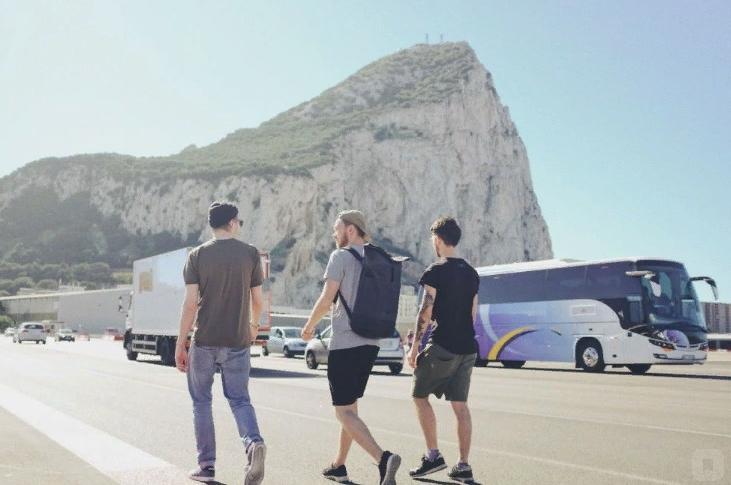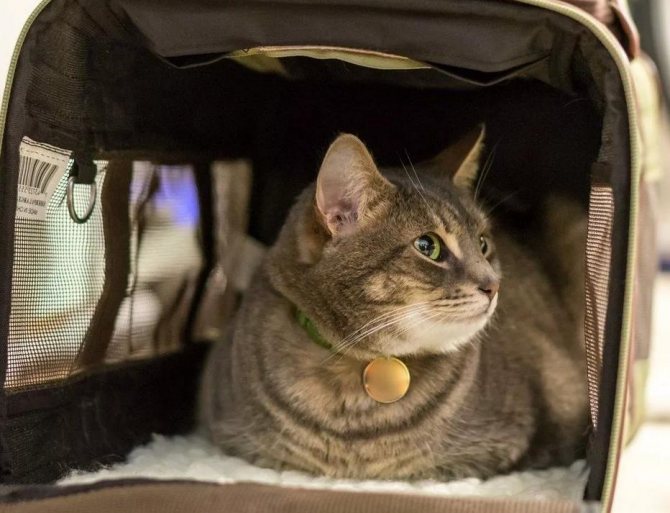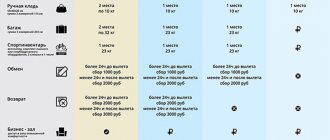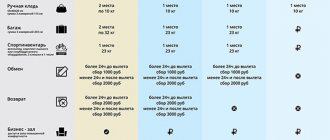What is considered baggage and what is carry-on luggage
To begin with, we note that the procedure and rules for transporting luggage on buses are regulated by Decree of the Government of the Russian Federation dated February 14, 2009 N112 “On approval of the Rules for the transportation of passengers and luggage by road transport and urban ground electric transport.”
The norms for the carriage of hand luggage and baggage, including free baggage, can be set by each individual carrier, but they must not contradict the requirements provided for in Article 22 of the Federal Law “Charter of Road Transport and Urban Ground Electric Transport”.
Baggage refers to items that travel separately from the passenger. This is their main difference from the so-called carry-on luggage. You can take one piece of checked baggage and one piece of hand luggage free of charge. To understand how much this is, measure your suitcase in advance: if the sum of three dimensions (length, width and height) does not exceed 120 centimeters, and the weight does not exceed 30 kilograms, you fit into the baggage allowance. This suitcase will need to be checked in as luggage.
If you have several large bags, this is additional luggage. For an additional fee, you can transport bags with dimensions of 100x50x30 centimeters. If the bus is equipped with a special luggage compartment, you will receive two pieces of luggage, each with dimensions of 100x30x30 centimeters. The weight of each piece cannot exceed 60 kilograms.
Carry-on luggage is a small bag that will travel with you in the cabin. This bag should take up no more than one seat you paid for. If you can’t fit it on your lap, in your legs, or under the seat in front, then it’s no longer carry-on luggage, but luggage, and you’ll have to check it into a special compartment. Taking an adjacent seat or placing a bag in the aisle is prohibited by transportation rules.
Terms of use
Approved by Decree of the Moscow Government No. 844-PP dated September 16, 2008 (as amended by Decree of the Moscow Government No. 187-PP dated April 19, 2016)
These Rules are mandatory for compliance by all persons located on the territory of the metro. Failure to comply with the requirements of these Rules entails administrative liability in accordance with the Moscow City Code of Administrative Offenses.
1. GENERAL PROVISIONS
1.1. The Metro is one of the main types of urban passenger transport, many of whose stations are monuments of history, culture, architecture and are protected by the state. The metro area includes stations and their sub-street passages, interstation tunnels and open areas, electrical substation sites, depots and ventilation shafts, and train cars.
1.2. The Metro is a transport enterprise associated with increased danger. In order to prevent accidents with passengers and illegal actions, 24-hour video surveillance with video recording is carried out at stations and in train cars.
1.3. Persons on the territory of the metro must be mutually polite, give up seats in train cars to disabled people, elderly people, passengers with children and women, maintain cleanliness and public order, and treat the subway's facilities and equipment with care.
1.4. The Metro provides safe and comfortable transportation of passengers of all categories, including those that meet the requirements for ensuring access for people with disabilities and other people with limited mobility, as well as passengers with strollers, to infrastructure facilities (metro stations, their under-street passages, train cars).
2. PAYMENT PROCEDURE AND CONDITIONS OF TRAVEL AND BAGGAGE CARRIAGE
2.1. Metro stations are open for entry and transfer from one line to another daily from 05:30 am to 1 am.
2.2. Passage beyond the checkpoints of metro stations, as well as baggage transportation, is carried out on a paid basis, with the exception of the passage of citizens who are granted benefits in accordance with the law. Baggage, the sum of whose dimensions in length, width and height is in the range from 121 cm to 150 cm, long items, the length of which is from 151 cm to 220 cm, are paid separately for each piece. The number of pieces of baggage allowed for transportation should not exceed two pieces per passenger. It is prohibited to use wheeled vehicles to transport luggage (with the exception of suitcases and shopping carts, the dimensions of which together with luggage do not exceed the sum of the length, width and height dimensions of 150 cm). The amount of payment for passenger travel and baggage transportation is established in the manner prescribed by law.
2.3. Passengers are required to present (hand over) a travel ticket or card with an electronic medium that allows them to pay for travel or exercise the right to free travel (travel at a reduced rate) (hereinafter referred to as the card), at the request of metro employees performing their duties at automatic checkpoints ( hereinafter referred to as the automatic transmission), as well as officials of the State Treasury Institution of the City of Moscow "Transportation Organizer", exercising powers to draw up protocols and consider cases of administrative offenses provided for in Article 10.9 of the Moscow City Law of November 21, 2007 N 45 "Moscow City Code on Administrative offenses." Travel tickets or cards do not provide free baggage allowance for paid baggage.
2.4. It is prohibited to use personalized preferential cards belonging to other persons to pass through automatic checkpoints, with the exception of cases of passage through automatic checkpoints of persons accompanying disabled people of group I (III degree of disability), as well as disabled children.
2.5. You are allowed to carry free of charge:
2.5.1. Children under 7 years of age.
2.5.2. Skis and skates in cases, children's bicycles, baby strollers, sleds, fishing rods, musical instruments and small garden tools, the dimensions of which do not exceed those specified in paragraph 2.10.1 of these Rules.
2.6. While on the escalator, you must stand on the right, facing the direction of its movement, walk on the left side, holding the handrail, do not step on the boundary line on the steps, do not lean against fixed parts, hold young children in your arms or by the hand, do not linger when getting off from the escalator.
2.6.1. In conditions of increased passenger flows, as directed by metro workers, fill the left and right sides of the escalator steps.
2.6.2. It is prohibited to move along a non-working escalator without permission from metro workers.
2.7. On the station platform, it is prohibited to go beyond the limit line at the edge until the train has completely stopped, and when it stops, space should be cleared at the doors of the cars for passengers to exit.
2.7(1). Passengers with children should board the carriage, letting the child(ren) pass in front of them.
2.7(2). It is prohibited to board the carriage when information is received that the carriage doors are closing (red lights above the doors flash, a sound signal sounds).
2.8. In the carriage, you should not lean against the doors or interfere with the entry and exit of passengers; when approaching the destination station, you should prepare in advance to exit.
2.9. All cases of people or things falling on the metro track, the occurrence of smoke or fire, as well as situations that may affect the safety of passengers or the movement of trains, must be immediately reported to the station duty officer, the train driver via the “passenger-driver” connection, or use emergency columns call.
2.10. It is prohibited to carry in the metro (to be with it in the lobby of stations):
2.10.1. Bulky luggage, the sum of the dimensions of which (except for specially specified cases) in length, width (two diameters or axes at the base of the roll) and height exceeds 150 cm, long items whose length exceeds 220 cm.
2.10.2. Firearms, piercing and breakable items without covers (packaging), including skis and skates, small garden tools with exposed sharp parts.
2.10.3. Flammable, explosive, toxic, toxic substances and objects, including household gas cylinders.
2.10.4. Bicycles (except for folding ones) and other vehicles, except children's and wheelchairs.
2.10.5. Animals and birds outside of cages or special containers (bags).
2.11. On the territory of the metro it is prohibited:
2.11.1. Drink beer and drinks made on its basis, alcoholic and alcohol-containing products, consume narcotic drugs or psychotropic substances, appear in a state of intoxication.
2.11.2. Smoking.
2.11.3. Create situations that interfere with passenger flow.
2.11.4. Run along the escalator, sit and place things on the steps and handrails of the escalator.
2.11.5. Move around the territory of stations and along under-street passages of the metro on motorcycles, bicycles, scooters, roller skates and other transport and sports vehicles, except for wheelchairs.
2.11.6. Walk through and be at the station without shoes.
2.11.7. Descend into train tracks.
2.11.8. Place foreign objects on the subway tracks.
2.11.9. Open the doors of carriages during movement and stops, as well as prevent them from opening and closing at stops.
2.11.10. Travel on trains that do not carry or have ceased carrying passengers.
2.11.11. Unnecessarily use the “passenger-driver” connection, communication with the situational centers of the metro and internal affairs bodies on the metro (emergency call columns), the door shut-off valve in cars, the escalator stop handle.
2.11.13. Carry out filming and video shooting without written permission from the metro management.
2.11.14. Use the metro area for business and other activities without written permission from the metro management, as well as sell from hand in unidentified places.
2.11.15. Use sound amplification devices (except hearing aids), except in cases established by the Moscow Metro State Unitary Enterprise, and listen to audio recordings or audio broadcasts without headphones.
2.11.16. Be in dirty, smelly clothes, with luggage, objects, products (including drinks and ice cream in open containers) that can stain passengers, carriages, structures and station devices.
2.11.17. Litter and pollute structures, track devices, equipment, escalators, rolling stock and the territory of the metro.
2.11.18. Place luggage on carriage seats and station benches.
2.11.19. Unauthorized entry into production premises and fenced metro areas.
2.11.20. Build fires less than 10 meters behind the fence and in areas inside it on ground sections of the metro line, as well as less than 25 meters from ventilation kiosks.
2.11.21. Connect an electrical load to the metro networks without written permission from the metro management.
2.11.22. Cause damage to structures, track devices, equipment and rolling stock of the metro.
2.11.23. Sell cards and tickets for travel in the metro, as well as provide passage on them outside the checkpoints of metro stations to persons not authorized by the metro management.
2.11.24. Interfering with the performance of official duties by metro employees and not complying with their legal requirements.
2.11.25. To pester citizens with offers of purchase and sale, exchange, and also for the purpose of fortune telling.
2.11.26. Failure to comply with the legal demands of the people's vigilante when performing his duties to protect public order.
2.11.27. Engage in begging.
2.11.28. Apply inscriptions, images, place information and advertising materials on the external and internal surfaces of subway train cars, as well as on subway structures and structures, except those related to the procedure for their operation and (or) applied (placed) within the framework of the execution of a government contract or other agreement, concluded with the authorized executive body of the city of Moscow, a state unitary enterprise of the city of Moscow or a state institution of the city of Moscow.
2.11.29. Carrying out entertainment events, including the use of musical instruments, except for events held in the manner established by the State Unitary Enterprise "Moscow Metro".
RULES
FOR USE OF THE MOSCOW MONORAIL TRANSPORT SYSTEM
1. General provisions
1.1. The Moscow Monorail Transport System (hereinafter referred to as MMTS) is a transport enterprise associated with increased danger. These Rules for the Use of MMTS (hereinafter referred to as the Rules) are mandatory for unconditional compliance by all persons located on the territory of MMTS.
1.2. The territory of the MMTS includes stations, interstation sections, electrical substation sites, depots, electric rolling stock cars (hereinafter referred to as train cars).
1.3. Persons on the territory of MMTS must be mutually polite, give up seats in train cars to disabled people, elderly people, passengers with children and women, treat MMTS facilities and equipment with care, and maintain cleanliness and public order.
1.4. The work procedure and responsibility of MMTS officials for ensuring the safety of transportation and the culture of passenger service are determined by legislation and regulatory documents.
2. Payment procedure, travel and baggage conditions
2.1. MMTS stations are open for entry daily from 7.50 to 20.00.
2.2. Passage beyond automatic checkpoints (hereinafter referred to as automatic checkpoints) of MMTS stations, as well as baggage transportation, is carried out on a paid basis, with the exception of the passage of citizens who, in accordance with current legislation, have benefits.
Baggage, the sum of whose dimensions in length, width and height is in the range from 121 to 150 cm, long items, the length of which is from 151 to 220 cm, are paid separately for each piece according to the tariff. The number of pieces of baggage allowed for transportation should not exceed two pieces per passenger.
It is prohibited to use wheeled vehicles to transport luggage (with the exception of suitcases and shopping trolleys, the dimensions of which, together with luggage, do not exceed the sum of the length, width and height dimensions of 150 cm).
The amount of payment for passenger travel and baggage transportation is established in the manner prescribed by current legislation.
2.3. Passengers are required to present (hand over) a travel ticket or card with an electronic medium that allows them to pay for travel or exercise the right to free travel (travel at a reduced rate) (hereinafter referred to as the card), at the request of MMTS employees performing their duties at the automatic transmission, as well as officials of the State Treasury Institution of the City of Moscow “Transport Organizer”, exercising powers to draw up protocols and consider cases of administrative offenses provided for in Article 10.9 of the Moscow City Law of November 21, 2007 No. 45 “Moscow City Code on Administrative Offences”.
Travel tickets or cards do not provide free baggage allowance for paid baggage.
2.4. It is prohibited to use personalized preferential cards belonging to other persons to pass through the automatic checkpoint, with the exception of the passage through the automatic checkpoint of persons accompanying disabled people of group I (III degree of disability), as well as disabled children.
2.5. You are allowed to carry free of charge:
2.5.1. Children under 7 years of age.
2.5.2. Skis and skates in cases, children's bicycles, baby carriages and wheelchairs, sleds, fishing rods, musical instruments, small garden tools, the dimensions of which do not exceed the dimensions specified in paragraph 2.10.1 of these Rules.
2.6. While on the escalator, you must stand on the right, facing the direction of its movement, walk on the left side, holding the handrail, do not step on the boundary line on the steps, do not lean against fixed parts, hold small children in your arms or by the hand, do not linger when getting off escalator.
2.6.1. In conditions of increased passenger flows, as directed by MMTS employees, fill the left and right sides of the escalator steps.
2.6.2. It is prohibited to move along a non-working escalator without permission from MMTS employees.
2.7. On the station platform, it is prohibited to go beyond the limit line at the edge of the platform until the train has completely stopped, and when it stops, space should be cleared at the doors of the cars for passengers to exit.
2.7(1). Passengers with children should board the carriage, letting the child(ren) pass in front of them.
2.7(2). It is prohibited to board the carriage when information is received that the carriage doors are closing (red lights above the doors flash, a sound signal sounds).
2.8. In the carriage, you should not lean against the doors or interfere with the entry or exit of passengers; when approaching the destination station, you should prepare in advance to exit.
2.9. Immediately report all cases of people or things falling onto the running beam of the MMTS, the occurrence of smoke or fire, as well as situations that may affect the safety of passengers or the movement of trains to the station duty officer or the train driver via the passenger-driver connection.
2.10. It is prohibited to carry on the MMTS (located in the station lobby):
2.10.1. Bulky luggage, the sum of the dimensions of which (except for specially specified cases) in length, width (two diameters or axes at the base of the roll) and height exceeds 150 cm, long items whose length exceeds 220 cm.
2.10.2. Firearms, piercing and breakable items without covers (packaging), including skis and skates, small garden tools with exposed sharp parts.
2.10.3. Flammable, explosive, toxic, toxic substances and objects, including household gas cylinders.
2.10.4. Bicycles (except for folding ones) and other vehicles, except children's and wheelchairs.
2.10.5. Animals and birds outside of cages or special containers (bags).
2.11. On the territory of MMTS it is prohibited:
2.11.1. Drink beer and drinks made on its basis, alcoholic and alcohol-containing products, appear in a state of intoxication, consume narcotic drugs or psychotropic substances.
2.11.2. Smoking.
2.11.3. Create situations that interfere with passenger flow.
2.11.4. Run along the escalator, sit and place things on the steps and handrails of escalators, lean on the handrails of escalators.
2.11.5. Move around the stations on motorcycles, bicycles, scooters, roller skates and other transport and sports vehicles, except wheelchairs.
2.11.6. Walk through and be at the station without shoes.
2.11.7. Descend onto the MMTS running beam.
2.11.8. Place foreign objects on the running beam.
2.11.9. Open the doors of carriages during movement and stops, as well as prevent them from opening and closing at stops.
2.11.10. Travel on trains that do not carry or have ceased carrying passengers.
2.11.11. Unnecessarily use the “passenger-driver” connection in the train carriage, as well as the escalator switch with the inscription “Stop”.
2.11.12. Lost power. — Decree of the Moscow Government dated March 1, 2016 No. 62-PP.
2.11.13. Carry out filming and video shooting without written permission from MMTS management.
2.11.14. Use MMTS territories for business and other activities without written permission from MMTS management.
2.11.15. Use sound amplification devices (except hearing aids), except in cases established by the Moscow Metro State Unitary Enterprise, and listen to audio recordings or audio broadcasts without headphones.
2.11.16. Be in dirty, smelly clothes, with luggage, objects, products (including drinks and ice cream in open containers) that can stain passengers, carriages, structures and station devices.
2.11.17. Pollute and litter the territory of MMTS.
2.11.18. Place luggage on carriage seats and station benches.
2.11.19. Unauthorized entry into production premises and the fenced territory of MMTS.
2.11.20. Connect an electrical load to MMTS networks without written permission from MMTS management.
2.11.21. Cause damage to structures, running beams, equipment and rolling stock of the MMTS.
2.11.22. Sell cards and tickets for travel on MMTS, as well as provide passage on them outside the checkpoints of MMTS stations by persons not authorized by the management of MMTS.
2.11.23. Interfering with the performance of official duties by MMTS employees and not complying with their legal requirements.
2.11.24. To pester passengers for the purpose of buying and selling, exchanging or acquiring things in any other way, as well as for the purpose of telling fortunes or imposing any services.
2.11.25. Interfere with the lawful activities of a people's vigilante or a member of a public order center when he is performing his duties to protect public order.
2.11.26. Engage in begging.
2.11.27. Apply inscriptions, images, place information and advertising materials on the external and internal surfaces of MMTS train cars, as well as on MMTS structures and structures, except those related to the procedure for their operation and (or) applied (placed) within the framework of the execution of a government contract or other agreement, concluded with the authorized executive body of the city of Moscow, a state unitary enterprise of the city of Moscow or a state institution of the city of Moscow.
2.11.28. Carrying out entertainment events, including the use of musical instruments, except for events held in the manner established by the State Unitary Enterprise "Moscow Metro".
2.12.
Violation of these Rules entails administrative liability in accordance with the current legislation of the Russian Federation and the city of Moscow. RULES FOR TRAVEL, CARRYING HAND BAGGAGE AND STAYING PASSENGERS AT MOSCOW CENTRAL RING FACILITIES
These Rules and their implementation are aimed at ensuring transportation safety, improving the quality of passenger service and are mandatory for unconditional compliance by all persons located at the Moscow Central Ring facilities.
1. GENERAL PROVISIONS
1.1. The Moscow Central Circle is one of the types of urban passenger transport.
The territory of the Moscow Central Circle includes stations, transport hubs (hereinafter referred to as TPU), interstation sections, and train cars.
1.2. The Moscow Central Circle is a transport infrastructure associated with increased danger. In order to prevent accidents with passengers and illegal actions, video surveillance is carried out at stations, transport hubs and in train cars.
1.3. Persons on the territory of the Moscow Central Circle must be mutually polite, give up seats in train cars to disabled people, elderly people, passengers with children and pregnant women, maintain cleanliness and public order, and treat the structures and equipment of the Moscow Central Circle with care.
1.4. The work procedure and responsibility of officials providing transport services on the Moscow Central Circle for ensuring the safety of transportation and the culture of passenger service are determined by legislation and regulatory documents.
1.5. Passengers on trains, at stations and transport hubs of the Moscow Central Circle must follow the instructions of the employees providing transport services on the Moscow Central Circle.
1.6. The stations of the Moscow Central Circle are open for entry daily from 5:30 am to 1 am.
2. PAYMENT PROCEDURE AND CONDITIONS OF TRAVEL AND CARRIAGE OF HAND BAGGAGE
2.1. The conclusion of a contract for the carriage of a passenger is certified by a travel document.
2.2. Registration of travel documents for trains and replenishment of the Troika card is carried out at the ticket office, using ticket machines, as well as through the web resource.
2.2.1. The procedure for issuing and returning travel documents is regulated by regulations of the Ministry of Transport of Russia and the city of Moscow.
2.3. Passage beyond the automatic checkpoints of Moscow Central Circle stations (hereinafter referred to as automatic checkpoints) is carried out upon presentation of a travel document. Carriage of hand luggage in excess of the established norm (weighing more than 50 kg and (or) the size of which in the sum of three dimensions exceeds 180 cm) is carried out on a paid basis.
For persons who have the right to pay discounted or free travel fares, travel documents are issued on the basis of identification documents confirming this right. Carrying hand luggage in excess of the norm for preferential categories of citizens is paid in full.
The cost of passenger travel and carriage of hand luggage, bicycles and small pets is set in accordance with the tariffs approved by regulations of the city of Moscow.
2.4. At the request of employees providing transport services on the Moscow Central Circle and performing their duties at automatic checkpoints, or other authorized persons, after passing through automatic checkpoints, passengers are required to present a document confirming the right to travel, including at a reduced rate or free of charge.
2.5. It is prohibited to use preferential personalized cards belonging to other persons to pass through automatic checkpoints, with the exception of cases of passage through automatic checkpoints of persons accompanying disabled people of group I, as well as disabled children.
If it is difficult for a passenger or a person with limited mobility to pass through an automatic transmission, you must seek help from an automatic transmission inspector.
2.6. Passengers traveling on the Moscow Central Circle with children must not leave children unattended.
2.7. You are allowed to carry free of charge:
2.7.1. Child(ren) under 7 years of age. The person accompanying the child when passing through the turnstile is obliged to exercise caution, hold the child in his arms or walk with him, letting him pass in front of him and holding him in close proximity to himself, taking all measures within his power to prevent harm to the child. When driving two or more children under the age of 7 years, you must seek help from an automatic transmission inspector.
2.7.2. Hand luggage weighing no more than 50 kg, the size of which does not exceed the sum of three dimensions (length, width and height) 180 cm. Hand luggage includes things passengers carry with them, regardless of their type and type of packaging, which in size are placed in passenger carriages in places intended for hand luggage, based on the design features of the carriage.
2.7.3. Passengers with children and disabled people with limited mobility are provided with a child stroller and a wheelchair, respectively, as well as other technical means of rehabilitation necessary for their movement.
2.7.4. A guide dog (muzzled, on a leash) accompanying a disabled person.
2.7.5. No more than one unassembled bicycle, subject to conditions that exclude inconvenience for the passage of other passengers. The bicycle must be placed on the platform provided for this purpose and secured to bicycle racks, preventing its spontaneous movement around the cabin.
2.7.6. Small domestic (pet) animals, dogs and birds in boxes, baskets, cages, containers, which must be arranged in such a way that the possibility of harm by animals to passengers and the carrier is excluded. It is allowed to transport small dogs without containers, muzzled, on a leash, and cats under the supervision of their owners or accompanying persons.
2.8. It is allowed to carry for a fee:
2.8.1. Electronic, household, video and audio equipment, which in the sum of three dimensions exceeds 180 cm, regardless of whether the passenger has hand luggage, no more than one item per travel document.
2.8.2. Objects, regardless of weight, whose dimensions in the sum of three dimensions exceed 180 cm.
2.8.3. Large (in the train vestibule) and service dogs, muzzled and on a leash, under the supervision of their owners or accompanying persons.
2.9. It is prohibited to carry things (objects) along the Moscow Central Circle as hand luggage, except in cases provided for by the legislation of the Russian Federation, which may damage or contaminate the carriage or the belongings of other passengers, as well as foul-smelling, flammable, poisonous, flammable, explosive and other dangerous substances , firearms, sharp and easily breakable items without covers (packaging), including skis, skates, small garden tools with exposed sharp parts. Carry-on luggage is not allowed in the aisles between seats.
2.10. While on the escalator, you must stand on the right, facing the direction of travel, walk on the left side, holding the handrail, do not step on the boundary line on the steps, do not lean or lean luggage against fixed parts of the escalator, do not leave children unattended, do not allow them touch the balustrade with your hands and feet, hold small children in your arms or by the hand, do not linger when getting off the escalator, lift long outerwear and shopping trolley bags to avoid them getting into the ridge of the escalator and staircases, control the position of hand luggage, with the purpose of preventing its spontaneous movement.
2.10.1. In conditions of increased passenger flows, as directed by workers providing transport services on the Moscow Central Circle, occupy the left and right sides of the escalator steps.
2.11. While on the escalator it is prohibited:
2.11.1. Move along a non-working escalator without permission from workers providing transport services on the Moscow Central Circle.
2.11.2. Run along the escalator, sit and place things on the steps, handrails and balustrade of the escalator, slide down the balustrade and handrails of the escalator.
2.11.3. Unauthorized removal of barriers installed on the lower and upper platforms of the escalator.
2.11.4. Use the stop switches (handle (button) for stopping the escalator).
2.11.5. Transport children in strollers.
2.12. At the station, it is prohibited to go beyond the limit line at the edge of the platform until the train has completely stopped, and when it stops, space in front of the doors of the cars should be cleared for passengers to exit.
2.12.1. Passengers with children should board the carriage, letting the child(ren) pass in front of them.
2.12.2. It is prohibited to board the carriage when information is received that the carriage doors are closing.
2.13. The carriage should not interfere with the entry and exit of passengers; when approaching the destination station, you should prepare in advance to exit.
2.14. While in a train carriage, passengers should remove bulky hand luggage (bag, backpack, etc.) from their backs (shoulders).
2.15. If you find forgotten items or documents on the territory of the Moscow Central Circle and in train cars, you must inform the employees providing transport services on the Moscow Central Circle, the train driver or police department employees.
2.16. All cases of people or objects falling on the tracks, smoke or fire, as well as situations that may affect the safety of passengers or the movement of trains, must be immediately reported to any employee providing transport services on the Moscow Central Circle.
2.17. On the territory of the Moscow Central Circle it is prohibited:
2.17.1. Drink beer and drinks made on its basis, alcoholic and alcohol-containing products, use narcotic drugs or psychotropic substances, appear in a state of intoxication.
2.17.2. Smoking.
2.17.3. Create situations that interfere with passenger flow.
2.17.4. Travel on motorcycles, bicycles, scooters, roller skates and other vehicles and sports vehicles, except wheelchairs.
2.17.5. Descend into train tracks. Retrieve objects that have fallen along the way.
2.17.6. Place foreign objects on railway tracks.
2.17.7. Prevent the opening and closing of automatic train doors.
2.17.8. Be on trains that do not carry or have stopped carrying passengers.
2.17.9. Climb and ride on roofs, automatic couplers and other elements of trains, enter and travel in train cabins.
2.17.10. Stand on parapets, fences, and jump over them.
2.17.11. Apply inscriptions, images, post information, advertising and other materials without written permission from the management of the Moscow Central Circle.
2.17.12. Carry out filming, photography, video shooting using professional and (or) stationary equipment.
2.17.13. Use the territory of the Moscow Central Circle for engaging in business and other activities without written permission from the management of the Moscow Central Circle, as well as carry out trade from hand.
2.17.14. Be in dirty, smelly clothes, with luggage, objects, products (including drinks and ice cream in open containers) that can stain passengers, carriages, structures and station devices.
2.17.15. Litter and pollute structures, track structures, equipment, escalators, trains and the territory of the Moscow Central Circle.
2.17.16. Place hand luggage on carriage seats, station benches and transport hubs.
2.17.17. Unauthorized entry into production and technical premises of the Moscow Central Circle.
2.17.18. Make fires and use pyrotechnic devices (fireworks, firecrackers, etc.) on the territory of the Moscow Central Circle.
2.17.19. Cause damage to structures, track devices, equipment and trains of the Moscow Central Circle.
2.17.20. Sell travel documents for travel along the Moscow Central Circle, as well as provide passage through them outside the automatic transmission stations of the Moscow Central Circle to persons not authorized by the management of the Moscow Central Circle, in order to obtain commercial benefits.
2.17.21. To pester citizens with offers of purchase and sale, exchange, and also for the purpose of fortune telling.
2.17.22. To interfere with the performance of official duties by employees providing transport services on the Moscow Central Circle, and not to comply with their legal requirements.
2.17.23. Engage in begging.
3. RESPONSIBILITY FOR VIOLATION OF TRAVEL RULES, CARRYING HAND BAGGAGE AND STAYING AT MOSCOW CENTRAL RING FACILITIES
Violation of these Rules entails prosecution in accordance with the legislation of the Russian Federation and the city of Moscow.
Where will your luggage go?
Photo: @ghpvisuals / @paulrysz
Suitcases and bags, as well as strollers, bicycles and other large luggage are transported in a special luggage compartment of the bus. The bus driver most often accepts the luggage, and either the passenger or the driver puts the luggage in the compartment and unloads it.
Baggage acceptance is issued by a receipt: it can be either a paper form or a token with a number that is assigned to the suitcase.
How much does extra luggage cost?
We have already indicated above what size luggage you can take with you for free. If your suitcase is larger or you want to take several bags with you, you will have to pay for them at the rates set by the carrier. Unfortunately, they are not regulated; each bus company sets them.
On average, the cost of additional luggage is 10-15% of the ticket price. You can pay for your luggage either directly on the bus (the driver will accept the money) or at the ticket office at the bus station.
For example, in the Moscow region, carrying luggage whose parameters exceed the established norm will cost 22 rubles if you are traveling 25 kilometers or less from the city, 44 rubles (distance from 25 to 50 kilometers) or 66 rubles (over 60 kilometers from Moscow ).
If you travel by bus to Europe, fares will be in euros. The average surcharge will be from 10 to 15 euros per bag. Transporting a folded bicycle will cost 10-20 euros, depending on the carrier.
Please note that they can accept a child’s sled, a pair of skis, small animals and birds in a cage for free - but this will be hand luggage, and you will have to fit them in the cabin.
In addition, strollers and wheelchairs will be accepted free of charge and without questions asked. Both will need to be added.
Please also note that oversized cargo may not be accepted even with an additional payment if there is not enough space in the luggage compartment. It is better to clarify this issue in advance at the bus station or directly with the carrier.
Lost luggage
If the suitcases were loaded into the luggage compartment of the bus, then passengers can receive the cargo immediately upon arrival. If luggage was transported in a car, delivery may be delayed. In most cases, cargo is delivered the next day. For long-distance flights, a delay of 2-3 days is acceptable.
Lost luggage can be reported 10 days after the passenger’s arrival. The exception is when a specific date is indicated. If lost, the passenger can count on compensation for the damage received.
In order for the cargo owner to receive a refund for lost or damaged luggage, the following steps must be taken:
- At the point of arrival, contact the transport company.
- Present the issued receipts and baggage tags there.
- Draw up a commercial act. Documents must be in two copies. One of them remains with the carrier company, the other with the passenger.
- After receiving the report, file a claim against the carrier company. The claim is considered within 30 days from the date of filing.

How to transport an animal on a bus

Photo: @freestocks
It all depends on what kind of animal you take with you. According to the rules for transporting luggage on buses, small animals (dogs, cats, rabbits) travel with the owner for free: they are considered hand luggage. For a large dog you will have to buy a ticket, as well as a muzzle and a leash.
A small dog or cat will have to be placed in a special container, bag or carrier basket. It is best to carry it in your arms: it can shake on the floor, the sound of the engine can be heard better and the legs of passing passengers flash, which is not very good for the animal’s condition (transportation itself is stressful, do not aggravate it).
If you are traveling with a large dog, you will be seated in the back of the bus. You cannot let the animal off the leash while driving, and at stops, if you go out to get some fresh air and stretch your legs, you will have to take it with you.
Be prepared to present a certificate from a veterinarian about the health status of your pet (Veterinary Certificate, Form No. 1). The certificate must contain information about vaccinations, including against rabies (it is valid for 1 year).
Rules for transporting animals
Pets can travel by bus with their owner, it is extremely important to organize the transportation correctly.
For cats, birds, rodents and small breed dogs, you must purchase a carrier. It is best to place the luggage on your lap. Placing the cage on the floor will increase the animal's stress.

Large breed dogs are transported without a cage. However, the owner needs to take care of several things:
Spinach roots may contain substances used to make explosives
It is much easier for them to achieve their goals than for others: astrologers named 5 zodiac signs
Cleaning the bathroom and 9 other pointless household chores that we waste time on
- before the trip, the animal must be examined by a veterinarian, all necessary vaccinations must be done (this is confirmed by a certificate);
- in the cabin the dog must be on a leash with a muzzle;
- A separate ticket is purchased for the animal.
Passengers with a dog are accommodated in the rear of the bus. During the trip, the animal must not be let off a leash or left unattended. If the owner gets off the bus at the parking lot, he must take his pet with him.

What can't be carried as luggage on a bus?
On buses, as on trains and planes, there are a number of luggage restrictions. So, you cannot take the following with you on the road:
- flammable substances
- toxic substances
- hunting weapons without the necessary packaging
- objects that stain the bus, luggage and clothes of other passengers
- items that are too heavy (more than 60 kilograms) and exceed the permitted baggage dimensions
- oversized luggage that cannot be placed in the luggage compartment
- improperly packed luggage (for example, an uncaged parrot)
If you are traveling abroad by bus, the carrier has the right not to accept the cargo, which may complicate customs clearance and cause a flight delay.
Preview photo: @mike


